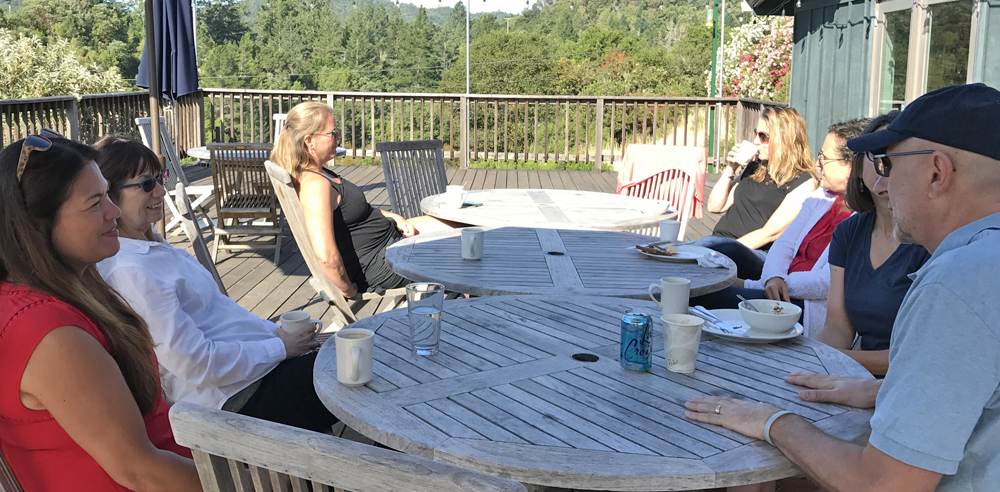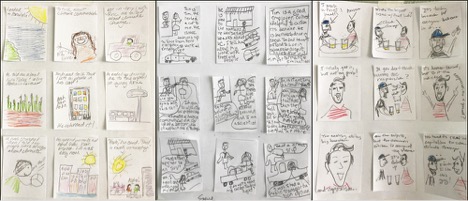Posted - 01/15/2018 Comfort With Discomfort by Faith Kearns and Clare Gupta
Building the capacity for relational engagement on climate change between scientists and communities. By Faith Kearns and Clare Gupta
It was a warm weekday night in the middle of our typically dry California summer as our group gathered around a fire ring at Mayacamas Ranch in Sonoma County to talk about relationship-centered approaches to climate change. We couldn’t have known then what we do now – that this beautiful ranch would suffer devastating damage in the wildfires that are still burning through this beloved part of the world. It now feels like a bit of a full circle moment – so much of the work that we are carrying out today was inspired by the collective grief around a large set of wildfires that happened in an adjacent California county just a decade ago.
We’d spent a full day talking about, and experiencing, emotions around climate change and how scientists, particularly those working in cooperative extension who interact with California communities every day, might approach the issue differently. And yet, even after delving deeply into some challenging material, that night around the fire we spontaneously started to sing campfire songs. Something about that singing was reflective of larger truths: that exploring even the “dark emotions†isn’t something to fear, and that connection offers a way through.
Earlier that day, we had learned about relational theory and tools from a lawyer, a medical anthropologist, and a psychotherapist. As we mentioned in our previous post, many of these fields have greatly advanced relational research, practice, and tools that are readily applicable in the natural sciences.
Gail Silverstein, a clinical lawyer at UC Hastings, shared the theoretical underpinnings and evolution of relational work in law, and led us in some profound exercises she does with her students. Leslie Davenport, author of Emotional Resiliency in the Era of Climate Change, helped us to think (and feel) more about the role of denial and grief in climate work based on her efforts to support psychotherapists to work with clients on climate change related issues. Juliet McMullin, a medical anthropologist at UC Riverside, pushed all of us to do something we didn’t think we’d be able to do – create a comic representation (in about 20 minutes!) of a conversation we’d had with somebody about climate change. It turned out to be an incredibly insightful exercise.
The second day of our pause was spent planning concrete steps that we can take moving forward – both collectively and individually. Some of that work is already taking place. For example, we are working to create a community of practice within our UC Cooperative Extension community and keeping an eye out for professional training and other opportunities to engage a larger group of our colleagues. In addition, we have already submitted a proposal for one of bigger ideas, with more to come.
Near the end of our time together, we asked everyone to describe an “aha†moment they had at our gathering and the feedback was exactly what we’d hoped for. For example:
We all walked away having learned so much from each other and, most importantly, from having practiced the work we are trying to bring into the world by having the time and space to be in deeper relationship with each other.
Thank you to Mayacamas Ranch staff for holding this space for us so beautifully. We are thinking of you.
 |
| Participants gathered at Mayacamas Ranch in northern California for an interdisciplinary pause. Photo by Susie Kocher. |
It was a warm weekday night in the middle of our typically dry California summer as our group gathered around a fire ring at Mayacamas Ranch in Sonoma County to talk about relationship-centered approaches to climate change. We couldn’t have known then what we do now – that this beautiful ranch would suffer devastating damage in the wildfires that are still burning through this beloved part of the world. It now feels like a bit of a full circle moment – so much of the work that we are carrying out today was inspired by the collective grief around a large set of wildfires that happened in an adjacent California county just a decade ago.
We’d spent a full day talking about, and experiencing, emotions around climate change and how scientists, particularly those working in cooperative extension who interact with California communities every day, might approach the issue differently. And yet, even after delving deeply into some challenging material, that night around the fire we spontaneously started to sing campfire songs. Something about that singing was reflective of larger truths: that exploring even the “dark emotions†isn’t something to fear, and that connection offers a way through.
 |
| Walking the talk over coffee. Photo by Faith Kearns |
Earlier that day, we had learned about relational theory and tools from a lawyer, a medical anthropologist, and a psychotherapist. As we mentioned in our previous post, many of these fields have greatly advanced relational research, practice, and tools that are readily applicable in the natural sciences.
Gail Silverstein, a clinical lawyer at UC Hastings, shared the theoretical underpinnings and evolution of relational work in law, and led us in some profound exercises she does with her students. Leslie Davenport, author of Emotional Resiliency in the Era of Climate Change, helped us to think (and feel) more about the role of denial and grief in climate work based on her efforts to support psychotherapists to work with clients on climate change related issues. Juliet McMullin, a medical anthropologist at UC Riverside, pushed all of us to do something we didn’t think we’d be able to do – create a comic representation (in about 20 minutes!) of a conversation we’d had with somebody about climate change. It turned out to be an incredibly insightful exercise.
 |
| Our climate change conversation comics. Photos by Faith Kearns, comics by Faith Kearns, Susie Kocher, and Dan Stark. |
The second day of our pause was spent planning concrete steps that we can take moving forward – both collectively and individually. Some of that work is already taking place. For example, we are working to create a community of practice within our UC Cooperative Extension community and keeping an eye out for professional training and other opportunities to engage a larger group of our colleagues. In addition, we have already submitted a proposal for one of bigger ideas, with more to come.
Near the end of our time together, we asked everyone to describe an “aha†moment they had at our gathering and the feedback was exactly what we’d hoped for. For example:
“I learned the importance of ‘knowing your audience’ as central to developing a relationship-centered approach to extension and climate change, including understanding social-cultural context and structural barriers or forces that inform people’s perceptions, values, and reasons for taking actions, or lack thereof.†Jennifer Sowerwine, UC Berkeley
“I learned language to put around the relationship-building aspect of addressing climate change. It’s clear that humanity won’t be able to address climate change without uniting across difference. This meeting emphasized the importance of interdisciplinary, creative thinking that happens when people put their egos aside and learn from one another. I will incorporate the ideas of ‘window of tolerance’ and increasing the tolerance for conflict into my classroom teaching so that my students can become more comfortable with touch, cross disciplinary conversations.†Elizabeth Allison, California Institute for Integral Studies
We all walked away having learned so much from each other and, most importantly, from having practiced the work we are trying to bring into the world by having the time and space to be in deeper relationship with each other.
Thank you to Mayacamas Ranch staff for holding this space for us so beautifully. We are thinking of you.
Categories
- All
- #ZeroBy2050
- 10Power
- 350 Seattle
- 36.5
- ANHE
- ARC-KE:i
- Al Gore
- Alicia Escott
- American Resilience Project
- Anjali Nayar
- Anthony Myint
- As You Sow
- At the Water's Edge
- Bard Center for Environmental Policy
- Beka Economopoulos
- Biomimicry Collaborative
- Bioneers
- Black Permaculture Network
- Blossoming Possibilities
- Blue Heart Labs
- Bodhi Garrett
- Britta Riley
- Bureau of Linguistical Reality
- C2C(Change 2 Climate)
- CELI
- COP21
- COP22
- California Foodways
- California Institute for Rural Studies
- Carbon Shock
- Casey Beck
- Catalogue of Extinct Experience
- Cathedral of St. John the Divine
- Center for Investigative Reporting
- Change the Bulb
- Chris Desser
- CityLab7
- Clean Energy Leadership Institute
- Climate Change
- Climate Science Alliance
- Climate Solutions Group
- CoClimate
- Convening 2010
- Coronavirus
- Council of Pronghorn
- Daily Acts
- Dancing Earth
- Dancing Without Borders
- Dr. Renee Lertzman
- Dream Rider Productions
- DreamRider Productions
- Duke University
- E2
- Earth Guardians
- Earthseed Consulting
- Eban Goodstein
- Eve Mosher
- Faith Kearns
- GAIA
- Gary Nabhan
- General
- Global Climate Action Summit
- Grant Partner Gathering
- Grant Partner Spotlight
- Grant Partners
- Grant Proposal Application
- Grants
- Happening
- Heidi Quante
- HighWaterLine
- Human Impacts Institute
- Impact Experience
- Impact Hours
- Invoking the Pause
- Joshua Fouts
- KALW
- KQED
- Kelly McVicker
- Kiss The Ground
- Libby Modern
- Lien Tran
- Lindley Mease
- Lisa Micheli
- Lisa Morehouse
- Magalie Bonneau
- Maggie Kaplan
- Mark Hertsgaard
- Mark Schapiro
- McDonalds
- Monica Wilson
- Morgan Curtis
- Natural History Museum
- Newsweek
- Nicole Heller
- Nicole Lederer
- Nina Simons
- Nina Wise
- Optimist Daily
- Pandora Thomas
- Paris COP21
- Pepperwood Preserve
- Peter Cunningham
- Planet Protector Academy
- Planet Protectors
- Post Pause
- Power Shift Network
- Presidio Graduate School
- Psych Alive
- Rainforest Connection
- Rebecca Patton
- Reinhard Hohlwein
- Rulan Tangen
- SPM3
- Sandra Kwak
- Sarah Cameron Sunde
- Science House Foundation
- Seeding Possibilities
- Seeds of Resistance
- Starbucks
- Stephen Antupit
- Sun Valley Forum
- SustainUS
- TIMBY
- Taco Diplomacy
- Tara DePorte
- Tensorflow
- Terry Tempest Williams
- The Arctic Cycle
- The Natural History Museum
- The Optimist Daily
- The Organic Life
- The Perennial
- The Redford Center
- Topher White
- Transition US
- Trathen Heckman
- Tribal Changes App
- University of Miami
- Videos
- Village Green(er)
- Wildlife Conservation Network
- Windowfarms
- Winters Past
- Works on Water
- World Business Academy
- XSproject
- Xi Martinez
- Zero Foodprint
- invoking the Pause

